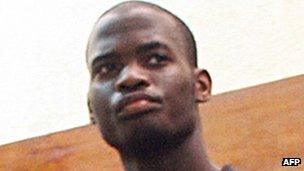Woolwich: Michael Adebolajo charged with Lee Rigby murder
- Published

Mr Adebolajo was charged after spending nine days in hospital
A second man has been charged with the murder of Drummer Lee Rigby in Woolwich, south-east London, on 22 May.
Michael Adebolajo, 28, of Romford, east London, was also charged with the attempted murder of two police officers and possession of a firearm.
He has been remanded in custody to appear at Westminster Magistrates' Court on Monday.
Michael Adebowale, 22, has already been charged with the soldier's murder and appeared in court on Thursday.
Multiple wounds
Mr Adebowale, of Greenwich, south-east London, was remanded in custody and is due to appear at the Old Bailey, London, on Monday.
He was charged after spending six days in hospital, having been shot by police and arrested following the attack on 22 May.
Mr Adebolajo, who was also shot and arrested at the scene, was charged after spending nine days in hospital and being taken into custody at a south London police station.
Both Mr Adebowale and Mr Adebolajo were filmed and photographed by witnesses following the attack, which took place on a busy street during the afternoon.
On Wednesday, a post-mortem examination found Drummer Rigby, from Middleton, Greater Manchester, died of "multiple incised wounds" after the attack.
Thousands of flowers have been laid at the scene of the killing by members of the public in honour of Drummer Rigby.
The total number of arrests made in connection with the attack stands at 12. So far, eight of those arrested have been bailed and two released without charge.
Meanwhile, far-right and anti-fascist groups have held rival demonstrations in central London amid increased tensions following Drummer Rigby's murder.
Police said 58 members of Unite Against Fascism had been arrested at a counter-protest sparked by a British National Party demonstration in Westminster. All were arrested for breaches of the Public Order Act.
On Friday, Drummer Rigby's family appealed for calm after reports of a rise in anti-Muslim incidents following the killing.
In a statement, they said the soldier would not have wanted his death used to excuse reprisal attacks, and called for people to "show their respect in a peaceful manner".
- Published1 June 2013